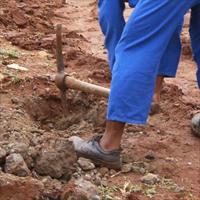DRC: Mass graves found in Bas-Congo, rights group claims

A Democratic Republic of Congo (DRC) human rights group has said mass graves with human remains have been found in the southwestern Bas-Congo Province where security forces recently clashed with followers of a religious sect.
"The most recent of these graves, containing the remains of 20 bodies, was discovered on 31 March in Materne, between Boma and Matadi towns," Amigo Gonde, coordinator of the NGO, African Association for Human Rights (Asadho), told IRIN.
"The other two graves - discovered further away and several days earlier - contained some 30 bodies."
Gonde, who demanded an independent inquiry, said one of the graves had apparently been dug up. "The grave at Materne had been dug up by unidentified persons and its contents taken to an unknown place, but there are indications to suggest the bodies were indeed there," he said.
DRC authorities could not be reached immediately for comment, but aid workers in the region said they were aware of the claims and were investigating.
Civilians in the area said a doctor in a rural health clinic, who first spotted one of the graves, had been questioned by local authorities.
"Justin Mabiala Ma Mabiala - who is the chief doctor of the rural health zone - was questioned for divulging a professional secret," according to a statement issued by another local human rights NGO, Voice of the Voiceless.
The remains, the NGO quoted local residents as saying, were suspected to be those of Bundu Dia Kongo sect followers because shreds of cloth and flags used by its members were found at the site.
Gonde denounced a continuing crackdown on the sect, saying security personnel were trying to apprehend some followers who had escaped into nearby forests.
Scores of people were killed in February and March during clashes between police and followers of Bundu Dia Kongo, which is contesting state authority. Aid workers said many others were wounded - some of whom sought treatment at various health facilities.
Aid workers said they saw empty villages with razed homes and that some of the wounded were forced to flee health centres. Some of the victims of violence were hit by stray bullets when they fled.
Bundu Dia Kongo’s spiritual leader and national assembly deputy, Ne Mwanda Nsemi, said he would initiate international judicial proceedings against “the massacre” of his members.
The sect is seeking to emancipate traditional African or Congolese culture and demands the restoration of the former Kingdom of the Congo. It has set up tribunals to try citizens who break the law and has its own police force. Occasionally they lower the national flag to hoist their own.
 Back and Next - Back and Next
Back and Next - Back and Next See Also - See Also
See Also - See Also